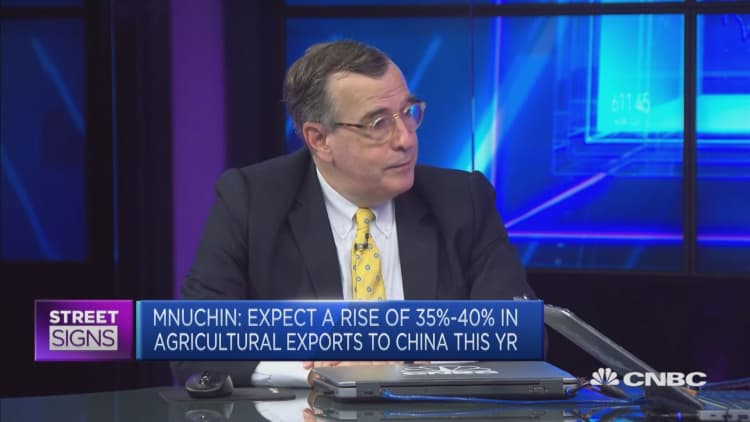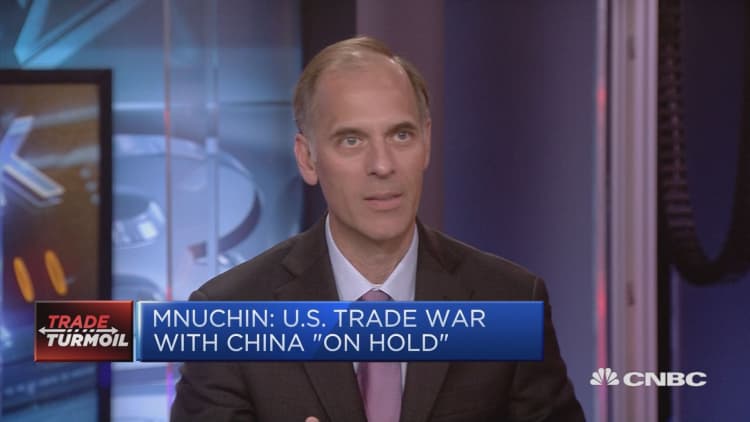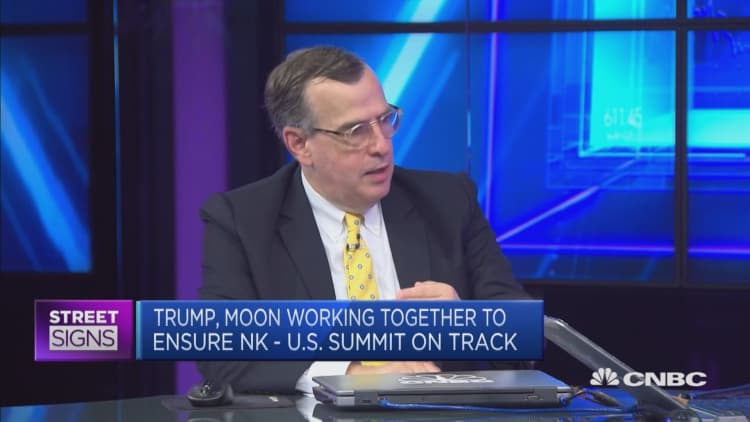
President Donald Trump's administration should focus on pushing for structural changes in China, rather than on the massive trade imbalance between the world's two largest economies, a former U.S. government official said Monday.
"I'd say focus more on structural changes, getting market opening, fair treatment, level playing field, IP (intellectual property) issues, investment protection. Focus on those kind of issues that will allow you to sell on market terms," said Frank Lavin, who was formerly U.S. Under Secretary of Commerce for international trade.
Lavin said the U.S. administration should be wary of getting a deal from Beijing that would only be a short-term solution.
"If they give you a check, watch out. They're sort of buying you off and getting you just to go away for that money, so be careful of that," Lavin said.
Lavin's comments came after U.S. Treasury Secretary Steven Mnuchin said on Sunday that the world's two largest economies agreed to drop their tariff threats while they work on a wider trade agreement.
On Saturday, Beijing and Washington said they would keep talking about measures under which China would import more energy and agricultural commodities from the United States to close its trade deficit with the U.S., which was $375 billion in 2017.
During an initial round of talks this month in Beijing, Washington demanded that China reduce its trade surplus by $200 billion, Reuters reported. No dollar figure was cited in the countries' joint statement on Saturday.

Trump "made a mistake anchoring negotiations on that number," said Lavin, who is currently the chairman of Export Now, a business consultancy. He was formerly also U.S. ambassador to Singapore under the George W. Bush administration.
"Because demand in China for U.S. food isn't going to double in a year, demand for Boeings isn't going to double in a year, and U.S. productive capacity can't double in a year either," Lavin told CNBC's "Street Signs."
The top U.S. trade official, Robert Lighthizer, said that getting China to open its market to more U.S. exports was significant, but that it was far more important for the United States to resolve issues with China, such as forced technology transfers and cyber theft.
"Real structural change is necessary. Nothing less than the future of tens of millions of American jobs is at stake," U.S. Trade Representative Lighthizer said in a statement on Sunday.
Many of Trump's complaints about China are valid, Lavin added.
Even though the Chinese economy has been gradually opening up over the past two decades, "the openings in China have not kept pace with the economic growth of China and with the benefits China has gotten from the rest of the world being more open," he said.
'Baby steps' more likely than North Korea denuclearization
Amid uncertainties over whether a high-profile meeting between Trump and North Korean leader Kim Jong Un will eventually take place in Singapore, Lavin said it is likely to happen.

But the outcome of an outright agreement of denuclearization from Pyongyang would be unlikely, he said.
"I'd be more positive about this process if some baby steps emerge, meaning I don't think we are likely to get a universal agreement to denuclearize North Korea, allow for inspections. I think that's unlikely and I think overly ambitious for a first meeting," said Lavin.
However, some "measurable baby steps" will help reassure the world that Kim is changing and that "it is a new North Korea," added Lavin. That could come in the form of family reunions, phone calls between North and South Korea and some steps toward currency convertibility, he said.
Pyongyang has in the past promised to back off its nuclear weapon development program, only to repeatedly backtrack.
South Korean President Moon Jae-in and Trump are set to meet on Tuesday in Washington before Kim meets with Trump on June 12 in Singapore.
Kim, on his part, will keep raising the price for denuclearization, such as bargaining for the unwinding of economic sanctions and some sort of military commitment from the U.S., like troop withdrawal from the region, Lavin predicted.
Reuters contributed to this story.

